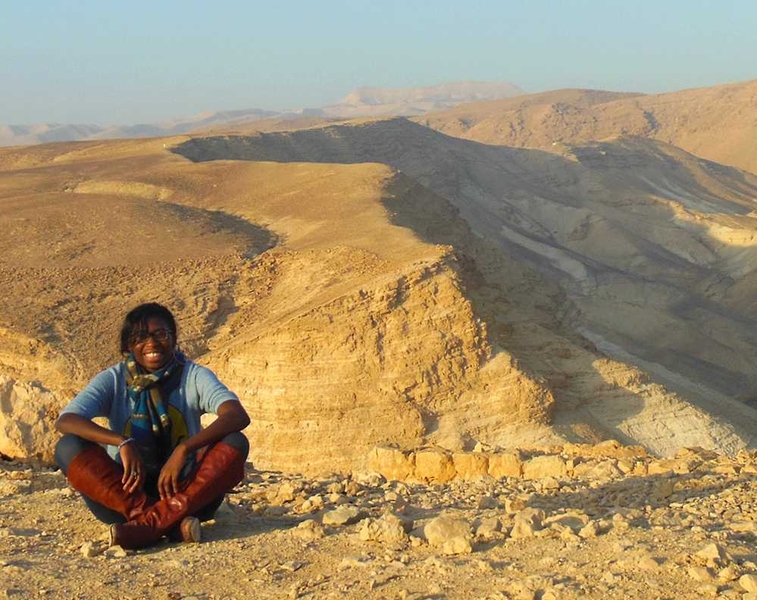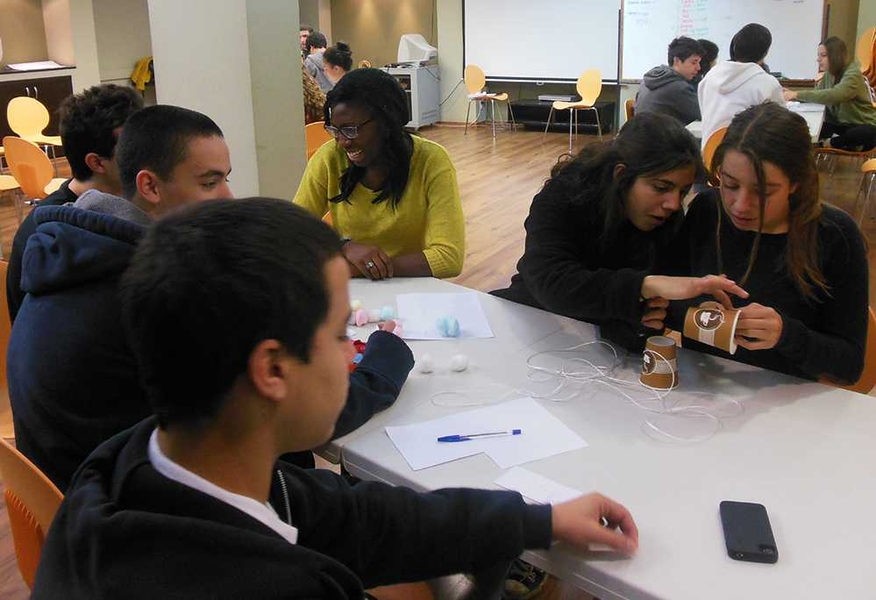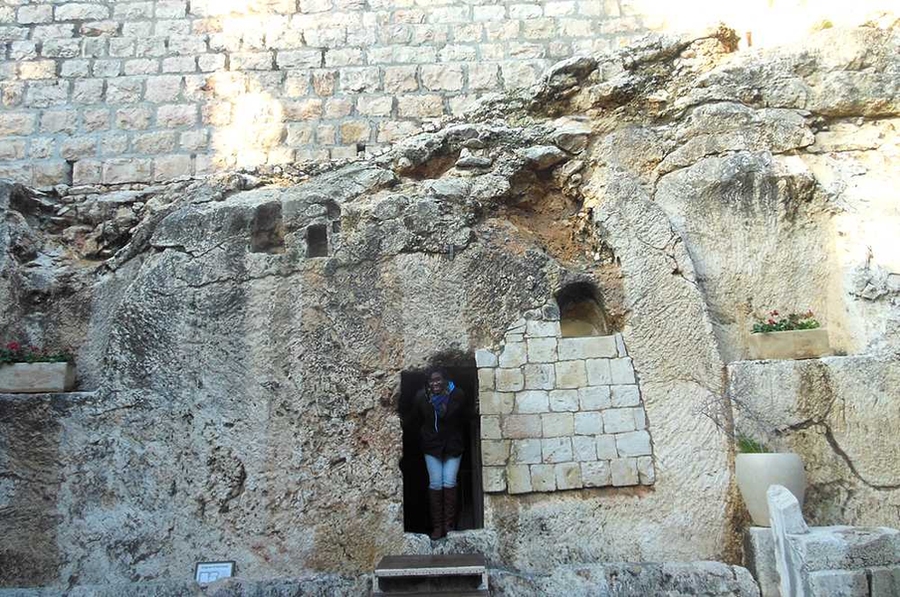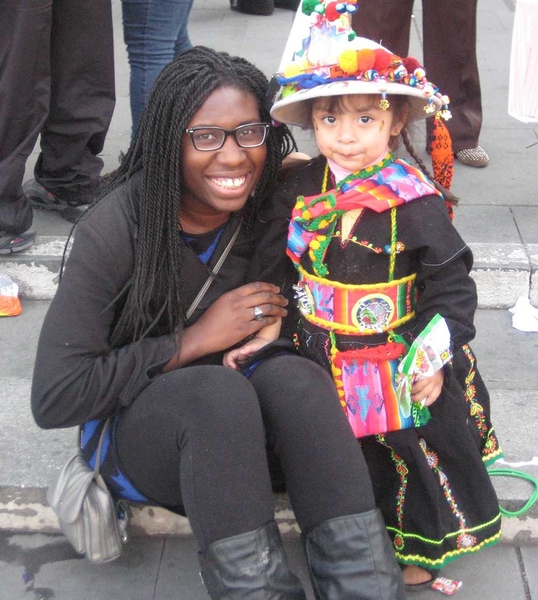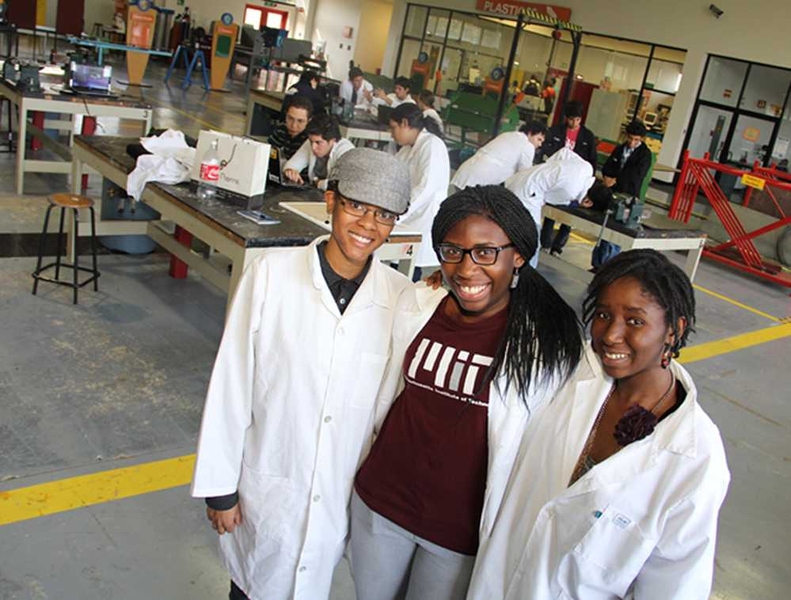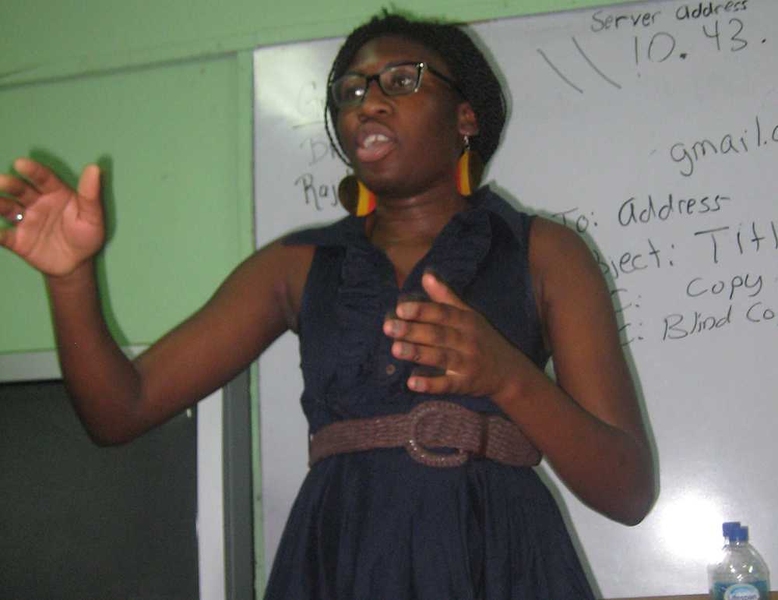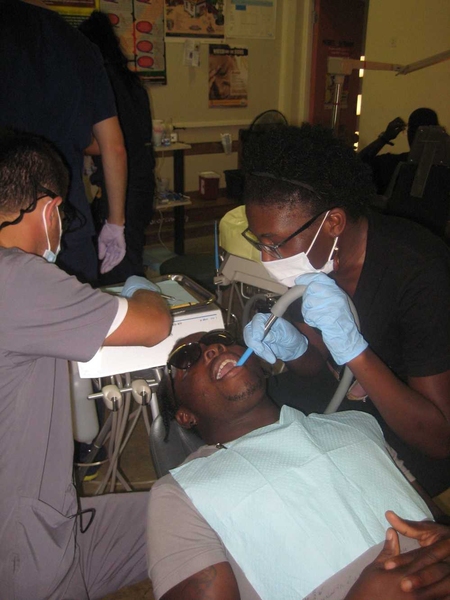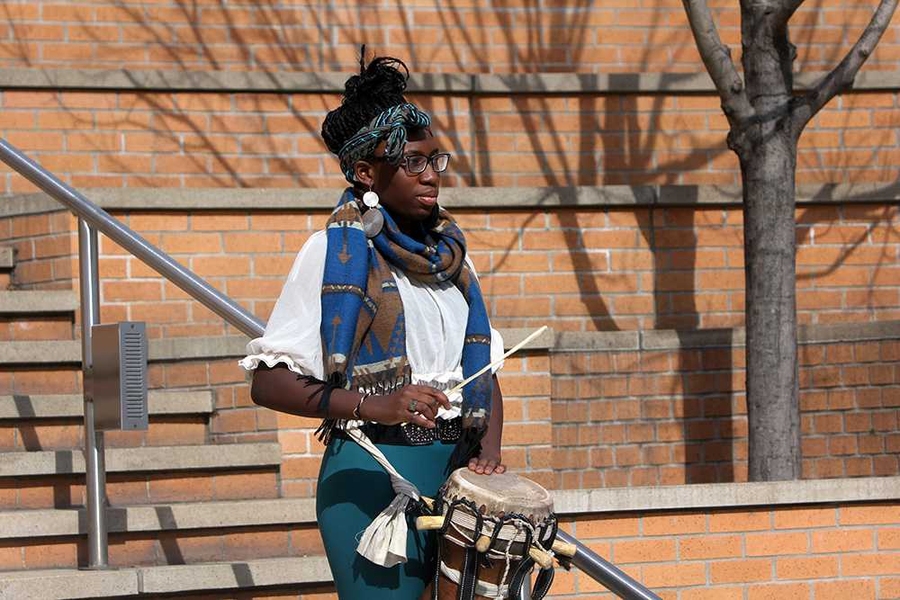MIT senior Joy Ekuta is a woman on the move: The brain and cognitive sciences major has made friends in the six states where she’s lived and colleagues in the five countries where she’s researched ADHD in children. She’s become fluent in Spanish, and taught new skills to students and teachers alike.
A dancer who sings with the MIT Gospel Choir, thumps out Senegalese drum beats, and bakes in her free time, Ekuta attributes her “people person” ways to her large family — she is one of five siblings — and to the many places she’s lived. Ekuta was born in Nigeria but moved with her family to the United States when she was a year old. Since then, her family has lived in five different states.
As a girl, Ekuta was encouraged by her father, a doctor, and her mother, a nurse, to pursue science. She loved her math classes in school and was particularly fascinated by a high school statistics class. “That was the first time that I saw an actual application of math,” Ekuta explains. “The teacher always says that later on you’re going to use math, but I actually saw it put into place.”
When it came time to choose a university, Ekuta’s visit to the Institute helped her decide. “MIT was the place that felt most down to earth, but people were really passionate about what they did,” she says.
Spanish steps
At first, Ekuta thought she would major in chemical engineering — until she took an introductory psychology course (9.00) in the Department of Brain and Cognitive Sciences. When she found herself interested enough in the course textbook to want to read it in her spare time, she says, “It was like, OK, I think I’ve found a major.”
Ekuta has also pursued an interest in computer science, which led her to a programming internship in Guadalajara, Mexico, the summer after her sophomore year. For an outgoing person like Ekuta, her limited ability to communicate in a second language was tough.
“The first month was probably one of the hardest of my life,” Ekuta says. “I hadn’t spoken Spanish since junior year of high school, but in my homestay, pretty much everyone only spoke Spanish. At work, it was all Spanish. In the streets, it was all Spanish.” But by the end of three months in Guadalajara, she was fluent.
Back on campus, Ekuta maintains her love of Latin American cultures by dancing salsa, bachata and merengue in her free time. Last summer she found her way to another Spanish-speaking community — this time, Chile.
There, Ekuta spent three months at Pontificia Universidad Católica in Santiago, researching the effects of ADHD on memory in children. The experience piqued her interest in the behavioral disorder, which affects some 3 to 5 percent of school-age children; boys are diagnosed about twice as often as girls. Ekuta’s research team studied boys from 9 to 12 years old: four with ADHD and four without.
“When our subjects came in, I couldn’t tell who had ADHD and who didn’t until I started looking at their brain waves,” Ekuta says. The researchers used electroencephalography (EEG) to track the children’s brain activity, placing electrodes along their scalps. “On some of the electrodes on the parietal lobe, after a span of maybe 10 or 15 seconds, the waves would just go off,” Ekuta explains. “That’s when you know the child lost attention.”
Ekuta’s main contribution to the project was writing a program to automate data analysis, allowing researchers to generate all the graphs they wanted with the click of a mouse.
Global education
Another of Ekuta’s passions is teaching. “For me, it’s really rewarding to teach someone and see them pick up a new skill that they didn’t know existed or that they didn’t believe they were able to do,” Ekuta says. She’s helped run an entrepreneurship workshop in Mexico and a computer-literacy program to train teachers in Jamaica; most recently, she conducted workshops on leadership and innovation in Israel.
Ekuta and four other MIT students spent January in Tel Aviv, running a four-day workshop at various high schools in the city. The capstone of the workshop was the presentation of original project ideas from the high school students to solve problems in their communities.
On the innovation-themed day of the workshop, Ekuta and her team members showed the students the much-watched video of Kelvin Doe, the 15-year-old inventor from Sierra Leone who visited MIT earlier this year.
“I think that was the turning point, every time, in our program,” Ekuta says. “To see somebody their own age doing something in another country — it starts to get their minds thinking about the actual problems in their community.”
One of the ideas the students had was an intercultural sports league. “Right now, there’s a lot of tension between the Israelis and Arab-Israelis,” Ekuta says. The students’ idea was to mix four existing Israeli teams and four Arab-Israeli teams, then have regular tournaments. “Playing with team members doesn’t mean you have to talk all the time, but you do have to work together,” Ekuta says. The school is attempting to secure funding to implement the idea, she adds.
Ekuta hopes to further explore her interest in education and health care after graduating. She wants to teach, either in Latin America or Africa, she says. “I haven’t been back to Nigeria for 10 years, so now that I am older, I hope to get a chance to have the in-country experience for that side of myself,” she says.
A dancer who sings with the MIT Gospel Choir, thumps out Senegalese drum beats, and bakes in her free time, Ekuta attributes her “people person” ways to her large family — she is one of five siblings — and to the many places she’s lived. Ekuta was born in Nigeria but moved with her family to the United States when she was a year old. Since then, her family has lived in five different states.
As a girl, Ekuta was encouraged by her father, a doctor, and her mother, a nurse, to pursue science. She loved her math classes in school and was particularly fascinated by a high school statistics class. “That was the first time that I saw an actual application of math,” Ekuta explains. “The teacher always says that later on you’re going to use math, but I actually saw it put into place.”
When it came time to choose a university, Ekuta’s visit to the Institute helped her decide. “MIT was the place that felt most down to earth, but people were really passionate about what they did,” she says.
Spanish steps
At first, Ekuta thought she would major in chemical engineering — until she took an introductory psychology course (9.00) in the Department of Brain and Cognitive Sciences. When she found herself interested enough in the course textbook to want to read it in her spare time, she says, “It was like, OK, I think I’ve found a major.”
Ekuta has also pursued an interest in computer science, which led her to a programming internship in Guadalajara, Mexico, the summer after her sophomore year. For an outgoing person like Ekuta, her limited ability to communicate in a second language was tough.
“The first month was probably one of the hardest of my life,” Ekuta says. “I hadn’t spoken Spanish since junior year of high school, but in my homestay, pretty much everyone only spoke Spanish. At work, it was all Spanish. In the streets, it was all Spanish.” But by the end of three months in Guadalajara, she was fluent.
Back on campus, Ekuta maintains her love of Latin American cultures by dancing salsa, bachata and merengue in her free time. Last summer she found her way to another Spanish-speaking community — this time, Chile.
There, Ekuta spent three months at Pontificia Universidad Católica in Santiago, researching the effects of ADHD on memory in children. The experience piqued her interest in the behavioral disorder, which affects some 3 to 5 percent of school-age children; boys are diagnosed about twice as often as girls. Ekuta’s research team studied boys from 9 to 12 years old: four with ADHD and four without.
“When our subjects came in, I couldn’t tell who had ADHD and who didn’t until I started looking at their brain waves,” Ekuta says. The researchers used electroencephalography (EEG) to track the children’s brain activity, placing electrodes along their scalps. “On some of the electrodes on the parietal lobe, after a span of maybe 10 or 15 seconds, the waves would just go off,” Ekuta explains. “That’s when you know the child lost attention.”
Ekuta’s main contribution to the project was writing a program to automate data analysis, allowing researchers to generate all the graphs they wanted with the click of a mouse.
Global education
Another of Ekuta’s passions is teaching. “For me, it’s really rewarding to teach someone and see them pick up a new skill that they didn’t know existed or that they didn’t believe they were able to do,” Ekuta says. She’s helped run an entrepreneurship workshop in Mexico and a computer-literacy program to train teachers in Jamaica; most recently, she conducted workshops on leadership and innovation in Israel.
Ekuta and four other MIT students spent January in Tel Aviv, running a four-day workshop at various high schools in the city. The capstone of the workshop was the presentation of original project ideas from the high school students to solve problems in their communities.
On the innovation-themed day of the workshop, Ekuta and her team members showed the students the much-watched video of Kelvin Doe, the 15-year-old inventor from Sierra Leone who visited MIT earlier this year.
“I think that was the turning point, every time, in our program,” Ekuta says. “To see somebody their own age doing something in another country — it starts to get their minds thinking about the actual problems in their community.”
One of the ideas the students had was an intercultural sports league. “Right now, there’s a lot of tension between the Israelis and Arab-Israelis,” Ekuta says. The students’ idea was to mix four existing Israeli teams and four Arab-Israeli teams, then have regular tournaments. “Playing with team members doesn’t mean you have to talk all the time, but you do have to work together,” Ekuta says. The school is attempting to secure funding to implement the idea, she adds.
Ekuta hopes to further explore her interest in education and health care after graduating. She wants to teach, either in Latin America or Africa, she says. “I haven’t been back to Nigeria for 10 years, so now that I am older, I hope to get a chance to have the in-country experience for that side of myself,” she says.
